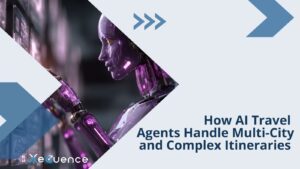Reasons why your hotel must embrace chat
- August 20, 2024
- XequenceAI
- Chatbot, Hotel Management, Hotel Marketing

Top Reasons Why Your Hotel Must Embrace Chat Technology
The fast changing digital landscape of today has seen chatbots emerge as a game-changer in the hospitality sector. The way that hotels engage with their customers is being completely transformed by these AI-powered virtual assistants, which are also increasing revenue and customer service.
Along with discussing the fascinating future of this technology, we will also address potential implementation issues hotels may have. A chatbot is an artificial intelligence driven software program that communicates with visitors through messaging apps or websites in the context of the hospitality business. To understand and reply to visitor inquiries, it employs machine learning algorithms or pre-established rules, resulting in a smooth and customized experience.
Handling Customer Requests
In addition to providing the operating hours of various hotel services and acting as a central repository for fundamental property information, chatbots can effortlessly handle small requests for fresh towels, extra pillows, shampoo, or soap. The days of guests having to struggle to figure out who to call by looking at a placard next to the phone are long gone.
Breaking the Language Barrier
Languages spoken by customers vary due to their diverse origins and cultures. A big obstacle for the sector is miscommunication. Personalized customer care is lacking and requests and inquiries are frequently mistranslated. Clients can converse with chatbots in their preferred language, making them feel like a personal companion.
Broadcast Notifications
Personalized upselling works really well with chatbots. They are also able to book dinner reservations, instantly remember and contact visitors, and periodically update them about new services and hotel amenities like spa treatments. In addition to setting alarms and reminders, bots can remind clients of the check-in and check-out timings.
Food Ordering
Guests can order food to be delivered to their rooms via chatbots. I don’t think calling the kitchen is as efficient as this. Using artificial intelligence travel, clients can click to instantly place an order by displaying the menu. For customers who are pressed for time, it is possible to pre-order room service and receive updates on the estimated wait time.
Reconnecting With Customers
Now that customers aren’t physically at the hotel, businesses can still interact with them. With the continuous updates that chatbots may offer, they can stay in contact with clients long after they have checked out. The likelihood of a repeat reservation is undoubtedly increased by doing this. Additionally, bots establish brand loyalty and serve as a excellent medium for customer feedback.
Highly Efficient Marketing Tool
Traditional email marketing channels are considerably less effective in marketing your services than chatbots. Emails have a conversion rate that is four times lower than chatbots because chatbots can engage users in personalized interactions. Significantly, greater open rates are seen in messages sent via Facebook Messenger. Six times greater than email lists, the open rates reach 70 to 100%, and the retention rate is much higher.
24/7 Customer Service
The response times of customer service are something that modern clients need. In the travel and hotel sectors, this can be particularly difficult because clients from all around the world may have inquiries at various hours. 24/7 customer support is one way that hotel chatbots can be helpful. That is to say, even in situations where you may not have customer care representatives available to directly assist consumers, they can still obtain prompt assistance, day or night.
Increase Direct Bookings
A major goal for individuals in the hotel business is to increase direct bookings. Hotel revenues are higher because they do not have to pay commissions on these bookings. By providing prompt answers to queries, a hotel chatbot can aid in this and boost the quantity of conversions on the hotel website. Moreover, chatbots can be used on social networking and instant messaging apps, giving users the opportunity to make reservations straight through those apps or using the primary booking system via direct links.
Support throughout the booking journey
By providing friendly, tailored assistance throughout the whole booking process, a hotel chatbot can help to improve the number of bookings that are made and decrease the number of bookings that are interrupted halfway through. Artificial intelligence travel may assist customers with information requests and questions, and it can also promote advancement. In order to make intelligent recommendations, chatbots can also be utilized from the beginning of the booking process. They can gather information about the user’s preferences, budget, and other details.
Follow up with your guests
In order to get feedback, hotels are realizing more and more how important it is to get in touch with former customers. In order to reach out to guests through a variety of channels, find out what they liked and didn’t like, ask them for recommendations for changes, and understand their general impressions of the hotel, chatbots are perfect for this function. Moreover, chatbots powered by data or AI can personalize their follow-up initiatives. More information on the hotel itself may be obtained from them, which can foster client loyalty and encourage return business.
The final words
Artificial Intelligence-driven chatbots will probably be utilized in more client interactions as chatbot technology develops. These are used at the hotel via a variety of digital devices, as well as on the website, social media, smartphone app, and in-person. Even though rule-based chatbots will probably still be helpful in the near future, AI-based solutions have clear advantages. You may anticipate seeing a lot of rule-based hotel bots replaced with AI-powered bots as this technology gets more user-friendly and less expensive to deploy. Voice-based chatbots are expected to become more prevalent than text-based chatbots as voice recognition technology advances and consumers grow accustomed to utilizing it. One of the biggest advancements in the future is probably going to be speech recognition technology for better language translation. It will enable people to converse orally with chatbots anywhere in the globe, be understood, and get responses in the respective language.
Recent Posts
5 Myths About AI in Hospitality Operations | Facts Every Hotelier Should Know
Newsletter
Get regular updates on data science, artificial intelligence, machine
You may also like

Al Flight Assistant Integration with Airline Reservation Systems

The Future of Hospitality Operations: AI Trends to Watch

AI Flight Assistants for Real-Time Flight Updates, Alerts




